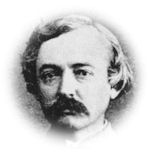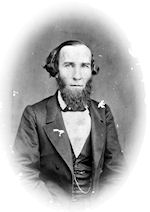(Tuesday, April 23rd)
On Tuesday morning we came to an anchor, and were told the ship was off the Naval Academy at Annapolis, on the Chesapeake Bay. Our experience the past two days has been most unpleasant. The ship is outrageously crowded from deck to keelson; towards evening of the first day out the wind began to blow, increasing until midnight, when it blew a gale and rain fell in torrents. Those of us who were quartered on deck got promptly soaked through, and as a rule were horribly seasick, with no conveniences, and packed literally like sardines in a box; the state of affairs may readily be imagined by one who has been to sea, but it is difficult to describe. Seasickness is a dreadful leveler of rank and destroyer of the ordinary amenities of life; every one is indifferent to the wants of others and utterly without sympathy. There were a few facetious fellows, too gross to feel the effects of the rolling of the ship themselves, who took a fiendish delight in dangling pieces of fat pork from the end of a string in the faces of those less gross, and this little pleasantry usually succeeded in producing the desired effect. There were many of us who wished more than once that we had never been born.
At 5 P. M. the first day out we fell in for dinner, struggled up to the galley, and there received a chunk of salt pork and large slice of bread, which we ate standing, bread in one hand, meat in the other. My piece of meat had a large bone in it, and smelt so badly that I threw it overboard to the fishes, and ate the bread alone. As the wind was freshening every minute, and the ship beginning to roll suspiciously, my appetite was not of the best, and later on entirely disappeared. Monday the wind went down and it stopped raining, but we did not get dried out, and as we had no shelter, were much the worse for want of sleep. There is not much romance about this, certainly, but we are beginning to get experience.
This morning, Tuesday, we found ourselves in company with five other vessels, all packed with troops similar to our own, convoyed by a small cutter called the Harriet Lane, a handsome craft carrying a couple of guns, and regular man-of-war crew. She is ready for action and looks quite warlike. Abut nine o’clock we anchored, rations were issued, including hot coffee, the band shook themselves together and played some stirring airs, and as the sun came out just about this time, we soon forgot our little troubles and became thoroughly interested in the magnificent view around us. The bay was smooth as glass, all the ships were gay with bunting, and crowds of armed men were mustering on every deck, while their bands were playing, sending their martial strains far over the silvery surface of the placid waters. Surely this is a small but beautiful picture of glorious war that we have dreamed of so much. Some time afterwards a tug boat came puffing along, and reported to the officer commanding the Lane that the rebels were reported in force ashore, intending to dispute our landing. In consequence the Lane steamed in towards shore, guns shotted and run out; when she got pretty close she lowered boats, armed with howitzers and marines, and sent them in to land and reconnoiter the town. We knew Maryland was a questionable state, being about evenly divided in its sympathies, and, consequently, were greatly interested in the outcome of the present affair. If they proved friendly, our chances would be greatly improved; on the contrary, if they opposed our landing, the capital might be in serious danger. After a good deal of delay and manœuvering, the boat’s crews landed, finding nobody to oppose them. This was signaled to the Lane, when our ship was immediately ordered to weigh anchor, go in and disembark the regiment. We got aground, and were transferred to the steamer Boston, and then landed at the Naval Academy docks. The Academy we found deserted, the students scattered, and only a few men in charge. We stacked arms, broke ranks, and received rations, coffee, meat (the same old salt pork), and bread, but we did not confine ourselves to this diet; the grounds swarmed with negroes, men and women, who had for sale, in abundance, eggs, pies, butter, and milk; we soon bought them out, and for the first time since leaving home fared sumptuously. We appreciated it immensely, not yet being used to hard living and roughing it, and miss our regular meals prodigiously.
There were no white persons in the camp, nor any white men in town; all had disappeared, the negroes say, to join the rebel army. We remained overnight for want of transportation for the quartermaster’s department, and were quartered in some of the many class-rooms. We heard various rumors about the doings of the rebels in this neighborhood, and since dark have seen many blue lights and rockets in the air, no doubt signals to warn their friends of our arrival; we conclude rail traffic between here and Washington is destroyed, from the reports of the negroes, and that we shall have to march, instead of going by train, as was expected; and possibly have to fight, if, as is reported, some organized rebel troops are in the neighborhood. Marching in the condition we are in, loaded down with satchels, bundles, etc., is going to be very tiresome. It is nearly thirty miles to the junction, the place we must reach before we can go by rail.











